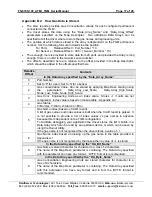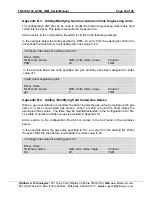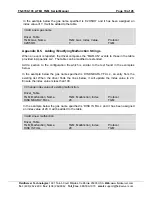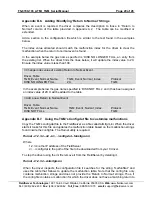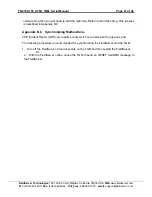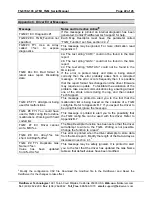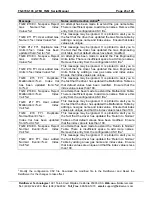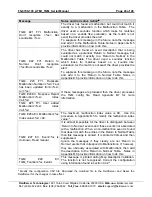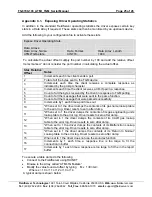
FS-8700-103_ATMI_TGM_Serial
Manual
Page
10
of
28
FieldServer Technologies
1991 Tarob Court Milpitas, California 95035 USA
Web
:www.fieldserver.com
Tel
: (408) 262-2299
Fax
: (408) 262-9042
Toll_Free
: 888-509-1970
4.4.4.
Map Descriptor Example #1 – CALR Report.
To be useful to the upstream device the driver reports gas concentration values and gas names from the QLA report. In reporting the
gas names it is most useful when a driver stores an index value which is used to imply the gas names. The reason this is most useful
is that it is typically easier for automation devices to work with numbers and not text.
When the driver reads the Calibration report, it does two things.
1) It stores a string of gas names vs. index values in the Data Array. This string can be viewed using the Ruinet Utility and may be of
help in interpreting the gas name index values stored by the QLA report.
2) The data is stored internally by the driver and when a QLA report is parsed the driver looks the gas names up in the CALR report
data and uses the lookup to determine what gas name index value to store.
// Client Side Map Descriptors
Map Descriptors
Map_Descriptor_Name, Data_Array_Name, Data_Array_Offset, Function, Node_Name, Address Length, Scan_Interval, TGM_Funtion
RD_CALR,
DA_CALR,
0,
RDBC,
Node_A,
0,
100,
600s,
CALR
No need to
read this report
too often.
Although not
mandatory it is
recommended
that each MD is
given a unique
name.
The node name connects the Map Descriptor to a
Node definition which in turn is connected to a port.
That is how the driver knows which port to use to
poll for this data.
A list of gas names vs. index values is
stored in the Data Array specified here.
In this particular example, the list is
stored as an ASCII string and hence it
makes most sense to ensure that the
Data Array’s format is BYTE so that it
can be viewed as a string when using
Ruinet.
Data storage
starts at this
location in the
Data Array.
Reserve enough
space in the Data
Array to store the
gas/index string.
Tells the driver
to read the
Calibration
report.
Tells the driver to repeat this
read task continuously. The
polling interval is set by the
Scan_Interval parameter.
For the CALR report is may
also make sense to use the
‘ARS’ function which gets the
driver to read this data once
each time the driver restarts.

















